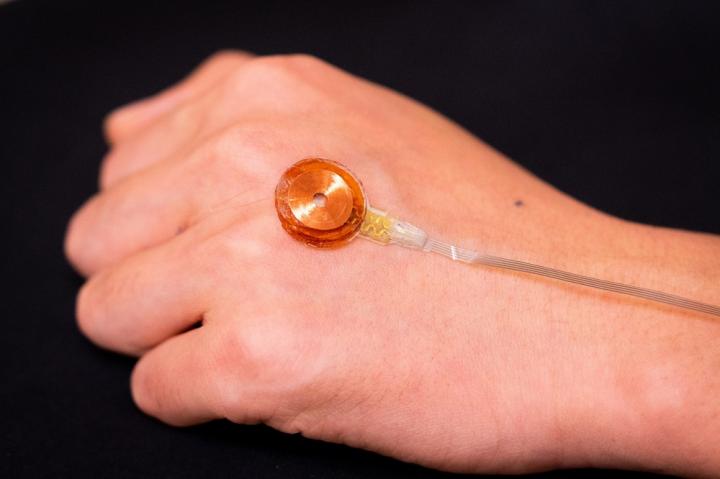By putting a piece of soft, strain-sensing sheet on the skin may be able to detect skin disorders non-invasively and in real-time very soon. A research team co-led by a scientist from City University of Hong Kong (CityU) has designed a simple electromechanical device that can be used for deep tissue pathology diagnosis, such as psoriasis, in an automated and non-invasive fashion. The findings will lay a foundation for future applications in the clinical evaluation of skin cancers and or dermatology diseases.
The research is co-led by Dr Yu Xinge, Assistant Professor from CityU’s Department of Biomedical Engineering, and scientists from and Northwestern University in the US. Their findings have been published in the science journal Nature Biomedical Engineering, titled “Miniaturized electromechanical devices for the characterization of the biomechanics of deep tissue“.
Electromechanical systems that enable precise, rapid measurements of the stiffness of soft tissues of the human body can provide useful clinical information for monitoring, diagnosing and treating various pathologies, particularly those of the skin. However, existing diagnostic evaluations, for example, magnetic resonance elastography, usually involve huge instruments at hospitals and trained practitioners. And the latest tissue stiffness-measuring technology based on sensing can only measure to superficial depths of upper skin, up to micrometre scale.
New device for real-time evaluations of deep tissue stiffness
To address the issue, the research team designed a simple, miniature electromechanical device for high-precision, real-time evaluations of deep tissue stiffness. The team used a miniature electromagnetic system that integrates a vibratory actuator and a soft strain-sensing sheet to monitor in real-time the Young’s modulus, ie the tensile stiffness, of skin and other soft biological tissues at depths of approximately 1 to 8 mm, depending on the sensor designs.
The team evaluated the device’s performance with a range of synthetic and biological materials, such as hydrogels, pigskin and on various parts of human skin. “The lesions exhibited higher stiffness than those of the nearby skin, primarily due to differences in skin elasticity and hydration. These simple measurements have potential clinical significance in rapidly identifying and targeting skin lesions, with capabilities that complement those of recently reported methods for sensing mechanical properties at tissue surface (typically micrometre-scale),” explained Dr Yu. He pointed out that cancer tissue is typically stiffer or softer than normal tissue, and such difference can be used as diagnostic biomarker for a range of skin conditions, like skin cancer or tumours under the skin.
Media Contact
P.K. Lee
[email protected]
Original Source
https:/
Related Journal Article
http://dx.





